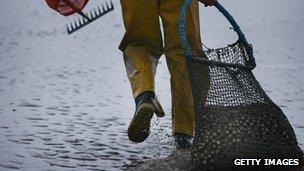Stephen Barclay: Gangmasters Licensing Authority lacks bite
- Published
- comments

Stephen Barclay MP says the GLA is under-resourced and wants it to have stronger powers
In 2005, following the Morecambe Bay cockle pickers tragedy, the government set up the Gangmasters Licencing Authority (GLA).
It followed a series of scandals involving the treatment of low-paid farm workers, many of them migrants. The GLA's job was to prevent any further exploitation.
Seven years on it seems there is still a long way to go.
"Many workers continue to live in a climate of fear," claimed Stephen Barclay MP, who has plenty of experience of farm workers and gangmasters. His North East Cambridgeshire constituency is one of the most rural in the east.
He told MPs that while the majority of gangmasters looked after their workers well, a report from Durham University due out shortly suggests that between 2,000 and 5,000 people in Britain are still experiencing "the worst manifestations of illegal gangmasters".
"It is a pressing issue for people who are here legally in this country. They are here to work, not to claim benefits and that alone should justify there being action."
Mr Barclay had secured a debate to call for more powers and resources for the GLA. He believes its powers are too limited to impose tough enough fines on those who abuse workers. It also has very few staff; just six cover the 12 counties in the east.
"That is the equivalent to Cambridgeshire and Norfolk being covered by just one inspector. With time taken travelling, let alone dealing with translation, intelligence gathering and the many other issues that an inspector has to address, I simply do not think it realistic to expect one inspector to cover 3,500 square miles."
He suggested the GLA had "no bite".
In the past two years there has been just 11 criminal prosecutions and 300 warning notices issued. Mr Barclay called for the authority to have the power to impose stronger fines and tougher sentences for those convicted.
The debate takes place at a time when the GLA faces an uncertain future.
There have been calls for it to be abolished with some people claiming its regulatory regime hinders economic growth.
The government has announced a change to its remit: it will no longer cover as many industries, it'll be easier to get a gangmaster licence, and there will be fewer inspections.

The GLA was set up following the Morecambe Bay cockle pickers tragedy in 2005
Trade unions and the Labour Party worry this will put even more workers at risk. A Commons motion signed by, among others, Luton's Kelvin Hopkins, claims the move will "put vulnerable workers at risk of exploitation, injury and death".
But the agriculture minister and Cambridgeshire farmer Jim Paice insisted the changes would allow the GLA to concentrate on "the most extreme cases", while providing easier light touch regulation for the majority of gangmasters who ran their operations well.
"This is not about removing protection for vulnerable workers," he said. "The GLA is there to provide protection and it should concentrate entirely on doing that and on detecting problems and enforcing legislation."
Mr Paice believes that in its seven years, the GLA has brought about big improvements to the way farm workers are treated. However, he accepts there is still more to be done.
His neighbouring MP, Stephen Barclay, will be watching closely.